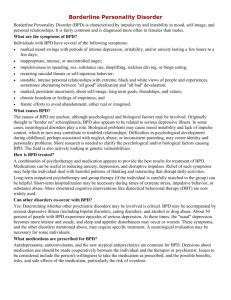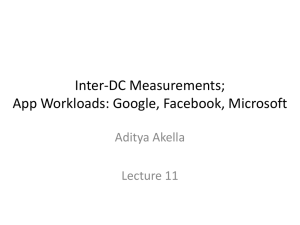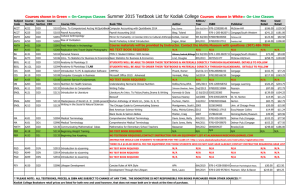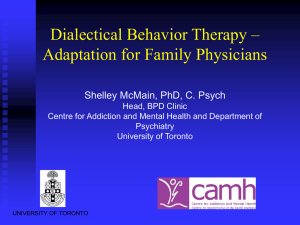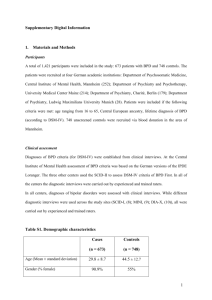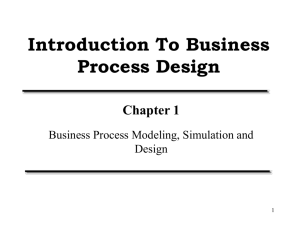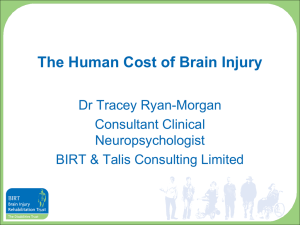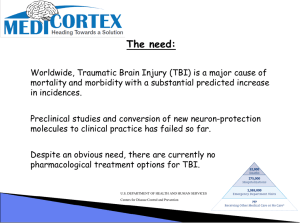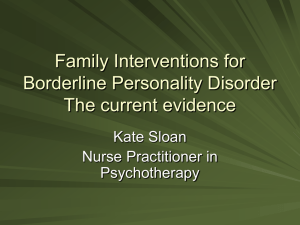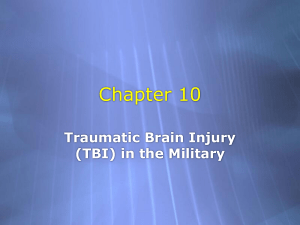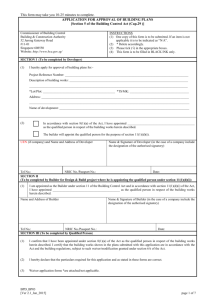Click here
advertisement
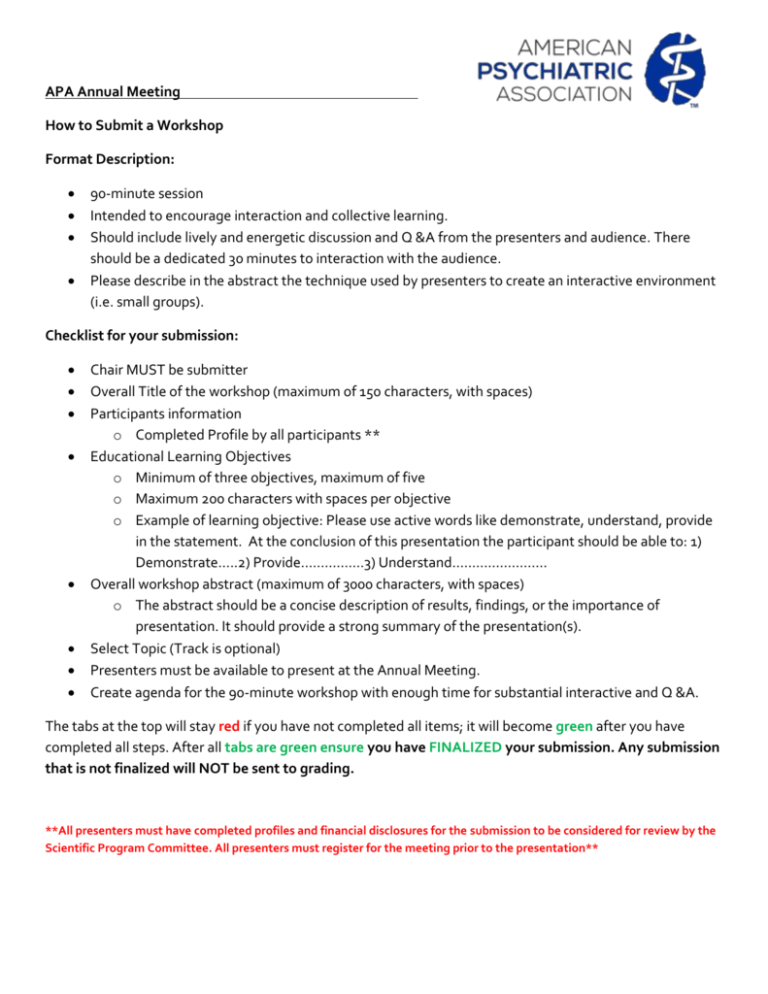
APA Annual Meeting How to Submit a Workshop Format Description: 90-minute session Intended to encourage interaction and collective learning. Should include lively and energetic discussion and Q &A from the presenters and audience. There should be a dedicated 30 minutes to interaction with the audience. Please describe in the abstract the technique used by presenters to create an interactive environment (i.e. small groups). Checklist for your submission: Chair MUST be submitter Overall Title of the workshop (maximum of 150 characters, with spaces) Participants information o Completed Profile by all participants ** Educational Learning Objectives o Minimum of three objectives, maximum of five o Maximum 200 characters with spaces per objective o Example of learning objective: Please use active words like demonstrate, understand, provide in the statement. At the conclusion of this presentation the participant should be able to: 1) Demonstrate…..2) Provide…………….3) Understand…………………… Overall workshop abstract (maximum of 3000 characters, with spaces) o The abstract should be a concise description of results, findings, or the importance of presentation. It should provide a strong summary of the presentation(s). Select Topic (Track is optional) Presenters must be available to present at the Annual Meeting. Create agenda for the 90-minute workshop with enough time for substantial interactive and Q &A. The tabs at the top will stay red if you have not completed all items; it will become green after you have completed all steps. After all tabs are green ensure you have FINALIZED your submission. Any submission that is not finalized will NOT be sent to grading. **All presenters must have completed profiles and financial disclosures for the submission to be considered for review by the Scientific Program Committee. All presenters must register for the meeting prior to the presentation** Example of Workshop Submissions MILD TRAUMATIC BRAIN INJURY: ASSESSMENT AND INITIAL MANAGEMENT WITH NEUROPHARMACOLOGY Chairs: David B. FitzGerald, M.B.A., M.D., Josepha A. Cheong, M.D. Speakers: David B. FitzGerald, M.B.A., M.D., Josepha A. Cheong, M.D. EDUCATIONAL OBJECTIVE: At the conclusion of the session, the participant should be able to: 1) Understand multiple areas of impairment/symptoms brought about by mild TBI ; 2) Identify pharmacological interventions which are appropriate for treating mild TBI; 3) Identify non-pharmacological interventions for treating mild TBI. SUMMARY: Loss of consciousness or alteration of consciousness for a short duration (less than 30 minutes) is thought to be a relatively benign experience, either in military settings or in civilian settings. The strengths and weaknesses of the current classification system of TBI are reviewed, with examples. A proportion of those experiencing brief loss of consciousness or alteration of consciousness (or mild TBI) have chronic adverse symptoms, which are only now being characterized. The magnitude of the problem in both military and civilian areas is discussed. Recent imaging data using conventional anatomical imaging as well as a review of diffusion weighted imaging after mild TBI are also presented to provide better insight as to mechanisms of damage. Current therapeutic approaches, both pharmacologic and non-pharmacologic approaches are discussed. A RESIDENT'S GUIDE TO BORDERLINE PERSONALITY DISORDER: FROM THE EXPERTS Chair: Brian Palmer, M.D., M.P.H. Speakers: John G. Gunderson, M.D., Kenneth R. Silk, M.D., Perry Hoffman, Ph.D. EDUCATIONAL OBJECTIVE: At the conclusion of the session, the participant should be able to: 1) Diagnose BPD and understand its relationship to other disorders; 2) Structure an effective psychotherapy for BPD; 3) Thoughtfully choose psychopharmacologic approaches that fit within a formulation of a patient's problems; 4) Effectively integrate family work into a treatment plan; 5) Establish a concrete plan for integrating BPD into their further psychiatric training. SUMMARY: Patients with BPD represent approximately 20% of both inpatient and outpatient clinical practice, and their effective treatment requires specific knowledge, skills, and attitudes that will be addressed in this workshop. This workshop is designed for and limited to residents, fellows, and medical students who, in training, often struggle with the treatment of these patients. In a highly interactive format, trainees will learn from and along with experts in the field of borderline personality disorder (BPD) to broaden and deepen their understanding of the disorder and its treatment. Alternating brief presentations of salient points with audience participation will allow participants to increase their knowledge and skill and to synthesize and apply the content as presented in the workshop. The workshop will be presented in two sessions (Part I and Part II). The workshop moves from an overview of BPD to essentials of psychotherapy and psychopharmacology, family therapy, and residency training objectives. Specifically, participants will review the diagnosis of BPD and its relationship with other disorders in order to build a basis for case formulation. Following this, the workshop examines core features of effective psychotherapy as well as (features) aspects of treatments likely to make patients worse. Strategies and common pitfalls in psychopharmacologic treatment for BPD are examined, with case material from both experts and participants. Principles of family involvement (follow) are presented, including data supporting the idea that families can and should learn effective ways of decreasing reactivity and increasing effective validation. Finally, objectives for residency education will help participants bring content from the workshop and integrate it with their current training. Participants are encouraged to attend both parts, though we will, in Part II, review material from Part I, so if necessary either session could be attended independently. Example of Workshop Submission WHAT TO DO WHILE WAITING FOR BETTER ANTIDEPRESSANT TREATMENTS: ANTIDEPRESSANT EFFICACY AND OPTIONS Chair: Jerrold F. Rosenbaum, M.D. EDUCATIONAL OBJECTIVE: At the conclusion of the session, the participant should be able to: 1) Address recent challenges in media to usefulness of antidepressants; 2) Review methodological challenges to evaluating antidepressant efficacy; 3) Consider options for treating depression; 4) Participate in a case-based discussion that illustrates the challenges and options while being on this course . SUMMARY: There is a broad range of views of the role of medications in the treatment of Depressive Disorders ranging from strongly positive advocacy of their efficacy and usefulness to claims of being no better than side-effect laden placebos. The views that support the latter opinion fail to consider the real methodological challenges to proving efficacy in large clinical trials as currently conducted. Further, practitioners know that standard dose monotherapy is unlikely to achieve and sustain benefits for the majority of sufferers over time. Using a case based history, this interactive workshop will review options and discuss these issues.
